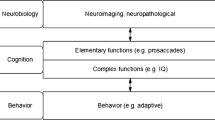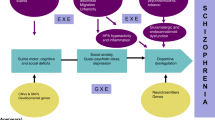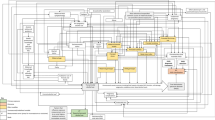Abstract
Postnatal environmental factors, such as early life adversity, cannabis use, and social stressors are associated with increased risk for psychotic disorders. Understanding mechanisms that underlie increased psychosis risk is of great importance for the development of novel preventive approaches and early interventions. In a timely review article, Pishva et al. discuss available evidence suggesting that postnatal environmental risk factors contribute to psychotic disorders via epigenetic mechanisms. While the evidence supporting this hypothesis is limited and primarily based on the epigenetic profiling of psychotic patients and animal models, further investigation in this area is warranted and may bring exciting results.
Similar content being viewed by others
References
van Os J, Kenis G, Rutten BP (2010) The environment and schizophrenia. Nature 468(7321):203–212
Pishva E, Kenis G, van den Hove D, Lesch KP, Boks MP, van Os J et al (2014) The epigenome and postnatal environmental influences in psychotic disorders. Soc Psychiatry Psychiatr Epidemiol 49(3):337–348
Akbarian S (2010) Epigenetics of schizophrenia. Curr Topics Behav Neurosci 4:611–628
Grayson DR, Chen Y, Dong E, Kundakovic M, Guidotti A (2009) From trans-methylation to cytosine methylation: evolution of the methylation hypothesis of schizophrenia. Epigenetics 4(3):144–149
Kirkbride JB, Susser E, Kundakovic M, Kresovich JK, DaveySmith G, Relton CL (2012) Prenatal nutrition, epigenetics and schizophrenia risk: can we test causal effects? Epigenomics 4:303–315
Mill J, Heijmans BT (2013) From promises to practical strategies in epigenetic epidemiology. Nat Rev Genet 14(8):585–594
Davies MN, Volta M, Pidsley R, Lunnon K, Dixit A, Lovestone S et al (2012) Functional annotation of the human brain methylome identifies tissue-specific epigenetic variation across brain and blood. Genome Biol 13(6):R43
Nestler EJ, Hyman SE (2010) Animal models of neuropsychiatric disorders. Nat Neurosci 13(10):1161–1169
Conflict of interest
There is no conflict of interest.
Author information
Authors and Affiliations
Corresponding author
Additional information
Submitted as an invited commentary on a review paper by Pishva et al. (2014) regarding epigenetic mechanisms in psychotic disorders, in the journal Social Psychiatry and Psychiatric Epidemiology.
Rights and permissions
About this article
Cite this article
Kundakovic, M. Postnatal risk environments, epigenetics, and psychosis: putting the pieces together. Soc Psychiatry Psychiatr Epidemiol 49, 1535–1536 (2014). https://doi.org/10.1007/s00127-014-0927-8
Received:
Accepted:
Published:
Issue Date:
DOI: https://doi.org/10.1007/s00127-014-0927-8




